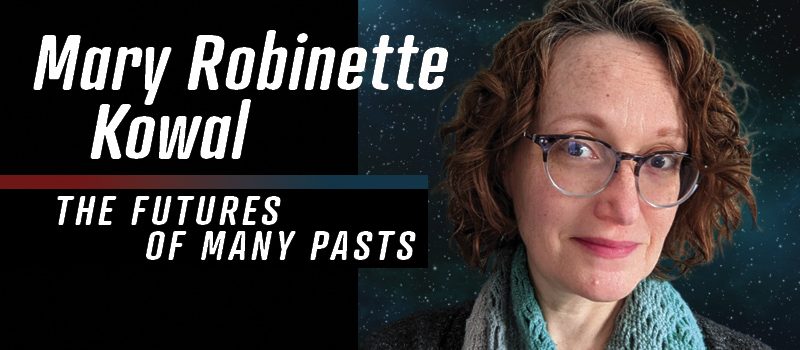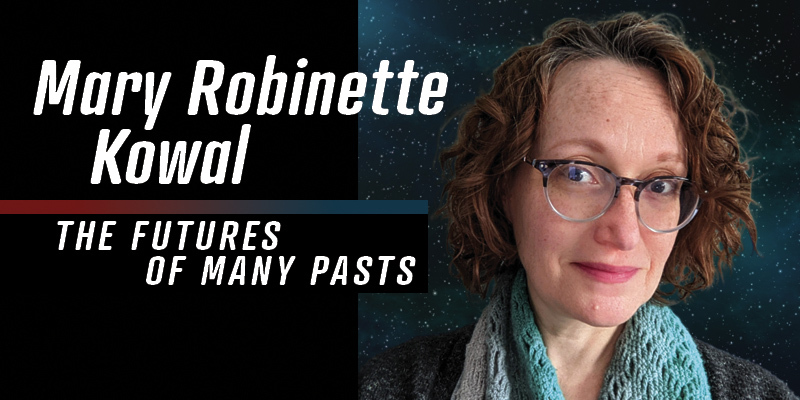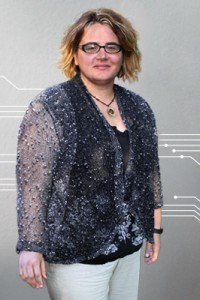Mary Robinette Kowal: The Futures of Many Pasts
MARY ROBINETTE KOWAL was born Mary Robinette Harrison on February 8, 1969 in Raleigh NC. She attended Eastern Carolina University, majoring in Art Education, with a minor in Theater and Speech. In 1991 she left for an internship at the Center for Puppetry Arts in Atlanta GA and never went back. She has been a professional puppeteer ever since. Kowal spent a year and a half working in Iceland on the children’s television show Lazytown, worked for various other shows and theaters, and ran her own company, Other Hand Productions. She is a prolific voice actor and audiobook narrator.
Kowal began publishing fiction in literary journals in 2004, and in SF magazines with “Portrait of Ari” in Strange Horizons (2006). Her work has since appeared in various genre magazines and anthologies. Notable stories include Hugo Award finalist “Evil Robot Monkey” (2008), Hugo winners “For Want of a Nail” (2010) and “The Lady Astronaut of Mars” (2013), and Nebula Award finalist “Kiss Me Twice” (2011). Some of her short fiction was collected in Scenting the Dark and Other Stories (2009) and Word Puppets (2015).
Kowal wrote the Jane Austen-inspired Glamourist Histories series: Shades of Milk and Honey (2010), Glamour in Glass (2012), Without a Summer (2013), Valour and Vanity (2014), and Of Noble Family (2015). Standalone Ghost Talkers (2016) is a fantasy set during WWI. Her Lady Astronaut of Mars series includes Hugo and Nebula Award winner The Calculating Stars (2018), The Fated Sky (2018), The Relentless Moon (2020), and numerous stories. Her latest novel, The Spare Man (2022), is a comedic SF murder mystery.
Kowal served as secretary for the Science Fiction and Fantasy Writers of America starting in 2008, spent two terms as SFWA vice-president starting in 2010, and was president from 2019-21. She stepped in as chair of Discon III, the 2021 World Science Fiction Convention, after the original chairs resigned.
Since 2008, Kowal has been part of the Hugo Award-winning Writing Excuses podcast. She also teaches classes and hosts a writing community at her Patreon: <www.patreon.com/maryrobinette>. She won the Astounding Award for Best New Writer in 2008, and received a Skylark Award for contributions to the SF field in 2022.
Kowal lives in Nashville TN with husband Robert Kowal, married 2001.
Excerpt from the interview:
“When I did Calculating Stars, knowing that I wanted to segue from fantasy to science fiction, I looked at doing something that still had historical elements, because I knew that’s what my audience was coming to me for – a certain measure of my audience wanted that historical vibe. I had been carefully training my readers and shifting so that I could retain an existing audience and then move toward being able to write whatever I wanted, basically. In my short fiction, I’ve always been someone whose work is all over the map, and I knew that I did not want to write Regency romances forever. While I love Jane Austen and I love Regency, I wanted to do more than that.
“For instance, as soon as I started working on the sequels in the Glamourist Histories, I began to change genre while looking like I was still doing Regency – the second book is a military spy novel, and then we’ve got a courtroom thriller, then a heist novel, and then basically a soap opera. But they’re all disguised as Regency romances. Then I did Ghost Talkers, which is set 100 years later, so it’s still historical, but it gets us into the beginning of modern era, the 20th century. (Most people forget about Ghost Talkers because I went on a book tour that started on Election Day of 2016.)
“I usually gravitate toward things I have already begun researching because I’m interested in the subject – it’s already caught my attention for some reason. But with Ghost Talkers, I had to do a lot of research because there’s what I think I know and there’s what’s actually happening. And with the Lady Astronaut books, I had to deal with a lot of received wisdom about space travel, for instance, like that it’s all white guys, and that’s flatly not true when you look at the historical record.
“Over the course of writing The Calculating Stars I became friends with several astronauts so I got to do a lot of NASA visits The most fun was doing a tour of the Neutral Buoyancy Lab – I got to spend an entire day watchingthem do what they call a Development Run, AKA a dress rehearsal for a spacewalk. I got to shadow Kjell Lindgren, and see him getting up at the crack of dawn, prepping his tools and seeing the meetings before they go into the pool, and the meeting after they go in the pools, and watching the support divers. It was really cool. I wrote a ton of raw notes that I wound up putting into various things. Frequently, the challenge for making something sound real is not specifically that you’ve got the jargon – it’s getting the rhythm of the language.
“The Calculating Stars covers 1952 through ’58. The book I’m working on right now is The Martian Contingency, the fourth in the series, and it’s ’69 to ’71. In the original ‘Lady Astronaut of Mars’ story, I didn’t tell anyone what the date was, but I had to figure that out when I decided to write a prequel series, and it’s around 1982. Every period you write in has social issues and challenges, but frequently they get ignored even though they offer such opportunities for storytelling. I can invent a conflict, or I can look at the conflicts that are baked in.
“This is the last book I’m contracted for in the Lady Astronaut series. The reason that we did a non-Lady Astronaut book in between The Relentless Moon and The Martian Contingency was that I knew I’d need more time to research Martian Contingency. It’s all Mars, all the time and I thought I needed more research time in order to write a Mars colony. But now that I’m actually writing the next book, I realized that I had already done much of the research that I need while writing Fated Sky and Relentless Moon.
“One of the tricky things for me is that, at this point in the series, the timeline has shifted sufficiently from our real world, so that I can’t just look up ‘how did they do it’ anymore. I decided to stick with technology that is within ten or maybe 20 years of where it was in our timeline. With a book set in 1969, I can use something from the early ’80s like shuttle technology – that’s fine. But when I’m looking at Mars research, I can’t give them 3D printers back then because they don’t have the microprocessors that we do. At the same time, at this point, they’ve already had boots on the ground on Mars, so they know more about the planet than we do. It’s this weird hybrid approach where I can use all the knowledge that we have about Mars, but I have to use all the technology and the ideas about how we would settle things, what tools we would use, from the appropriate time.
“That’s why I let myself go about 20 years into the future with rocketry and all of the space stuff. But I slowed the development of computers down slightly, because one of the reasons that we have microprocessors is that we needed them to go to the Moon. A lot of computer technology was developedfor the early space program, and in the Lady Astronaut timeline, they solved that problem by sending women into space who are actual computers – in the original sense of people who did all the calculations. They didn’t have the same time pressure to develop computer technology that we did. The transistor is still brand-new in my 1952, and the transistor didn’t actually come into existence until 1954 in the real timeline. Their batteries are way better than the batteries in our timeline, because that’s a problem they had to solve. Anything that’s a problem that they had to solve, I let myself go 20 years-ish ahead of reality. Sometimes, I just hand-waved – like, I have no idea how they’re dealing with radiation shielding. I just don’t talk about that because I don’t know what it is and don’t know how to fix it.
Interview design by Stephen H. Segal
Read the full interview in the April 2023 issue of Locus.
 While you are here, please take a moment to support Locus with a one-time or recurring donation. We rely on reader donations to keep the magazine and site going, and would like to keep the site paywall free, but WE NEED YOUR FINANCIAL SUPPORT to continue quality coverage of the science fiction and fantasy field.
While you are here, please take a moment to support Locus with a one-time or recurring donation. We rely on reader donations to keep the magazine and site going, and would like to keep the site paywall free, but WE NEED YOUR FINANCIAL SUPPORT to continue quality coverage of the science fiction and fantasy field.
©Locus Magazine. Copyrighted material may not be republished without permission of LSFF.








